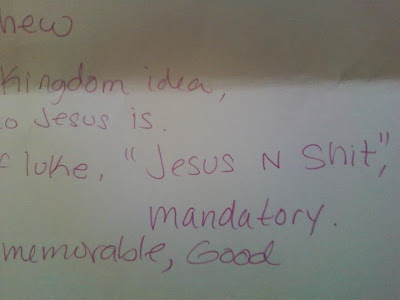Here is the "South Park" episode I tried hard to show you today.
Here is the VanDer Laan video on the Jordan/ Jesus' baptism I tried to show..
Next time! But check them out before if you can.
10 Ideas in the at "historical world" atmosphere in Jesus' day that impact how we read this chapter
1)Exodus and Exile: The two big events that were huge in common historical memory (see
2)Expectation of a New Moses/Deliverer
3)
a)Some streams of Scripure expected him to be royal/kingly/a Son ofa King (Psalm 2:12)
b)Other streams expected him to be a suffering servant (Isiaiah 42:1...and all of Isaiah 42-53
4)Importance of Abraham, and being his descendants:
a)The tradition and motto was if any Hebrews "accidentally" ended up in the kine for hell/wrath, Abraham would be at the door to clear it up (a 'get out of hell free' card)
b)Note: Abraham was willing to sacrifice his only son, whom he loved (Gen 22:2, first appearance of word "love" in Bible
5)Baptism: Until this time, it was basically
a)self-service (self-administered)
b)only for Gentile wanting to convert to Judaiasm
c)called to mind the Red Sea/Dance Party on the Beach
6)Prophets
a)"400 years of silence" between Testaments
b)when they did come, End times
c)"One like Elijah" or actually Elijah would come
7)Judgements:
a)Holy Spirit
b)Fire
8)Pharisees and Sadduccees: had differences, but sometimes connected
9)Symbolis of Israel/Jeruslem/God's people as a tree (sometimed fig tree). Postive image often: strong, produces fruit etc.
10)saved for next week..
----------------------------------------------------------------
Matthew 3 notes:
>>The early Christians clearly saw that the "baptism with the Holy Spirit and fire" was two pronged, bounded set judgement: Holy Spirit-baptism=good
Fire-baptism=bad (wrath, hell).
This would seem to be Matthew's emphasis
(Compare Luke's),
Note the context , before and after the passage quoted above, the references to "fire" are clearly negative.
There may be a chiasm to corroborate this. See Tony Siew:
Matthew 3:10 Even now the axe is laid to the root of the trees; every tree therefore that does not bear good fruit is cut down and thrown into the fire. 11 "I baptize you with water for repentance, but he who is coming after me is mightier than I, whose sandals I am not worthy to carry; he will baptize you with the Holy Spirit and withfire. 12 His winnowing fork is in his hand, and he will clear his threshing floor and gather his wheat into the granary, but the chaff he will burn with unquenchablefire."
A - Trees with fruits saved and trees without fruits thrown into fire
B - I baptize you with water
B' - He will baptize with the Holy Spirit and with fire.
A' - wheat into barns and chaff he will burn with fire.
This passage in Matthew's Gospel puts a greater emphasis on judgment compared to Luke's pericope in Luke 3:16-17. John the Baptizer has the warning of judgment that trees not bearing fruits will be thrown into fire just before the saying that Jesus will baptize the people with fire with another judgment saying following that the chaff will be burned with fire. The chiastic structure for Matt 3:10-12 is set out above. More than Luke, Matthew has it that the baptism of fire by Jesus is a baptism of judgment for the unrepentant or those not producing fruits worthy of repentance (Matt 3:8).: -Tony Siew
>>Voice of God "double pasted" at least two Scriptures, effectively combining the two streams of expectation of Messiah: a)Royal (Psalm 2:12) and b)Servant (Is. 42:1). Maybe a triple paste, as an intention reference to Abraham's "loved" son" Isaac is intentional here (Gen 22L2)
>>Many hyperlinks/intertextualities noted: "Dove" connects to Noah. "Spirit hovering over the water" happened at creation (Genesis...again). Thus this new version of the same could be a new creation.
>> We noticed hyperlinks/intertextuality to many scriptures (Dove mentioned oin account of Noah
>>John the Baptizer dressed like Elijah..(2 Kings..hmmm) Dress/diet showed he was
a)poor b)prophet c)outcast
--
Homework: Test next class -Tues. All Q and A at top of page
























